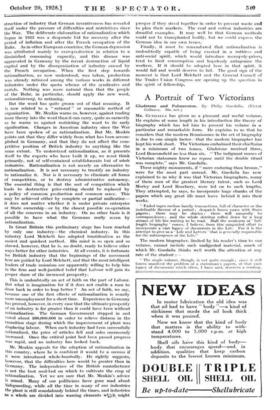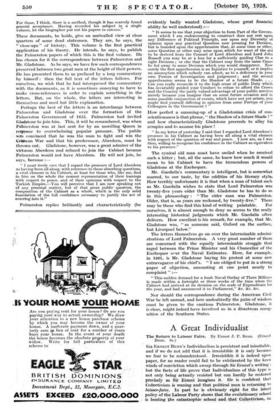A Portrait of Two Victorians
Ma. GUEDALLA has given us a pleasant and useful volume. He explains at some length in his introduction the theory of biography which has led him to present his volume in a particular and remarkable form. He explains to us that he considers that the modern Renaissance in the art of biography is due to one simple factor—that the modern biographer has kept his work short. The Victorians embalmed their chieftains in a minimum of two tomes. Gladstone received three, Lord Beaconsfield no less than six. " The indignant manes of Victorian statesmen knew no repose until the double ritual was complete," says Mr. Guedalla.
These mighty monuments, if " more enduring than bronze," were for the most part unread. Mr. Guedalla has now explained to us why it was that Victorian biographers, many of them men of the greatest literary talent, such as Lore Morley and Lord Rosebery, were led on to such lengths. They attempted, he says, to incorporate huge chunks of the papers which any great life must leave behind it into their works.
" Faded tapes enclose family transactions, full of character or the indefinable flavour of a period despatch boxes yawn with State papers ; there may be diaries ; there will assuredly be correspondence ; and the whole detritus rolled down by a long stream of life lies waiting to be read. Half the weakness of ` full- length biography ' comes, I believe, from this misguided effort to incorporate a vast legacy of documents in the Life. For it is the . attempt to give us a ' Life and Letters ' that is generally responsible for the submergence of the Life."
The modern biographer, limited by his reader's time to one volume, cannot include such undigested material, much of which Mr. Guedalla thinks well worth the attention at any rate of the student :— " The single volume, though, is not quite enough ; since it still leaves unsolved the problem of a statesman's papers, of that vast legacy of documents which often, I have said, deserves a reading. For these, I think, there is a method, though it has scarcely found general acceptance. Having recorded his subject in a single volume, let the biographer put out his papers in exten80."
These documents, he holds, give an unrivalled view at close quarters of some dead statesmen. They are, he says, the " close-ups " of history. This volume is the first practical application of his theory. He intends, he says, to publish the Palmerston 'papers of which this is the first volume. He has chosen for it the correspondence between Palmerston and Mr. Gladstone. As he says, we have few such correspondences preserved between two great men at the height of their powers. He has presented them to us prefaced by a long commentary by himself : then the full text of the letters follows. For ourselves, we wish that he had interspersed the commentary with the documents, as it is sometimes annoying to have to make cross-references in order to explain something in the letters. But, on the whole, the letters are interesting in themselves and need but little explanation.
- Perhaps the best of the letters is an interchange between Palmerston and Gladstone over the formation of the Palmerston Government of 1855. Palmerston had invited Gladstone to join him. This, it will be remembered, was when Pidmerston was at last sent for by an unwilling Queen in response to overwhelming popular pressure. The public was convinced that he was the man to fight and win the cridkean War and that his predecessor, Aberdeen, must be thrown out. Gladstone, however, was a great admirer of the virtuous Aberdeen and refused to join the Cabinet because Palmerston would not have Aberdeen. He will not join, he says, because :—
" I must freely own that I regard the presence of Lord Aberdeen as having been all along, with reference to these absorbing questions, a vital element in his Cabinet, at least for those who, like me, find in him on the whole the nearest representation of their leanings with respect to peace, and of their opinions with respect to the Turkish Empire.—You will perceive that I am now speaking not of any personal matter, but of that great public question, the composition of the Cabinet as a whole, which is the only solid foundation of the full confidence necessary to justify the act of entering into it."
Palmerston replies brilliantly and characteristically (he
evidently badly wanted Gladstone, whose great financial ability.he well understood)
It seems to me that your objection to form Part of the Govern. ment which I am endeavouring to construct does not rest upon any Difference of Political Principle, nor upon any Diversity of opinion upon any practical Question now pressing for Decision, but is founded upon the apprehension that, at some time or other, some Question or other may arise upon. which for want of the aid to be derived from the Counsel of Lord Aberdeen and Lord John Russell you may be at a loss for a sufficiently guiding Clue to a right Decision ; or else that the Cabinet may from the same Cause be led away to some Decision which you would disapprove. Now surely the first apprehension is an Injustice to yourself, or it implies an assumption which nobody can admit, as to a deficiency in your own Powers of Investigation and judgement ; and the second apprehension seems to be the Shadow of a future Shade. . . . Can you really reconcile it to the high sense of public Duty which has invariably guided your Conduct to refuse to afford the Crown and the Country the justly valued advantage of your public services merely because you imagine that on some future occasion and in some possible conjunction of events, which have not yet arisen, you might find yourself differing in opinion from some Portipn of your Colleagues in the Government ? "
How perfect a summing-up of a Gladstonian crisis of con- scientiousness is that phrase, " the Shadow of a future Shade ! "
and how characteristically Gladstone proceeds to allay his scruples and to assume his place !
" In my, letter of yesterday I said that I regarded Lord Aberdeen's presence in his Cabinet as having been all along a vital element with respect of the question of war and peace. I now am, as I was then willing to recognise his confidence in the Cabinet as equivalent to his presence."
The cynical old man must have smiled when he received such a letter ; but, all the same, he knew how much it would mean to his Cabinet to have the tremendous powers of Gladstone at the Exchequer. Mr. Guedalla's commentary is intelligent, but is somewhat marred, to our taste, by the oddities of his literary style. How terribly unfortunate it is that when a man of talent such as Mr. Guedalla wishes to state that Lord Palmerston was twenty-five years older than Mr. Gladstone he has to do so in this phraseology : " The older man was Palmerston.
Older, that is, as years are reckoned, by twenty-five." There may be those who find this kind of writing palatable. For ourselves, it is almost enough to deny us access to the really interesting historical judgments which Mr. Guedalla often delivers. How excellent is his remark, for example, that Mr. Gladstone was, " as someone said, Oxford on the surface, but Liverpool below."
The letters themselves go on over the interminable admini- strations of Lord Palmerston. A very great number of them are concerned with the equally interminable struggle that raged between the Prime Minister and his Chancellor of the Exchequer over the Naval Estimates. Here, for example, in 1861, is Mr. Gladstone baying his protest at some new extravagance of his chief's. " I am obliged to put in a strong paper of objection, amounting at one point nearly to complaint " :—
" This sudden demand for a fresh Naval Outlay of Three Millions is made within a fortnight or three weeks of the time when the Cabinet had arrived at its decision on the scale of Expenditure for the year, and had announced it to Parliament," &c. &c. &c.
Nor should the correspondence during the American Civil War be left unread, and here undoubtedly the palm of wisdom must be given to the cautious Palmerston. Gladstone; it is clear, might indeed have involved us in a disastrou.s recog- nition of the Southern States.































































 Previous page
Previous page